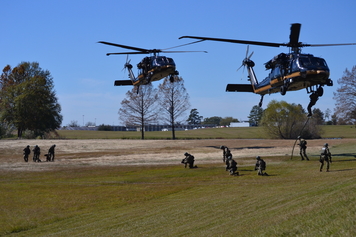ATF’s Special Response Teams (SRTs) are elite tactical groups that rapidly respond to high-risk law enforcement operations and conduct criminal investigations that lead to the arrests of the most violent criminals in the United States. Their work includes search and arrest warrants, high-risk criminal investigations, undercover operations, surveillance operations, and protective service operations.
Team members are specially trained ATF special agents who may serve full or part time. They often serve in various roles such as crisis negotiators, team leaders, tactical operators, snipers, operator medics and canine handlers.
In addition to their operational responsibilities, SRT members develop and implement law enforcement tactical policies and procedures to support ATF operations. They also teach operational and defensive countermeasures training to ATF agents.
ATF’s five SRTs are based strategically across the country in Detroit, Washington D.C., Dallas, Los Angeles and Jacksonville.

Tactics and Training

ATF special agents interested in joining SRTs must have a minimum of three years of work experience and very high scores on their work evaluations.
Once selected to join, candidates attend the 15-day SRT Basic Training School. During this intense program, they learn specialized skills such as marksmanship, manipulation of numerous weapon systems, individual and team tactical movement, tactical medicine, chemical agent deployment, use of less-lethal weapon systems, armored vehicle operations, surveillance, helicopter operations and operational planning. SRTs also participate in rigorous activities such as defensive tactics, breaching, rappelling, fast-roping, rural patrolling and operations.
New SRT members are on probation for one year after completing their specialized training, and all members must attend quarterly refresher trainings. They also participate in other operational trainings throughout the year to maintain their skill sets.
Activations

Special Response Teams, much like their counterparts on the National Response Teams and International Response Teams, are ready to travel at a moment’s notice to support high-profile cases. They work an average of 200 missions per year to bring violent offenders to justice. Some of their high-profile cases include the Boston Marathon Bombing and the D.C. Navy Yard shooting.


